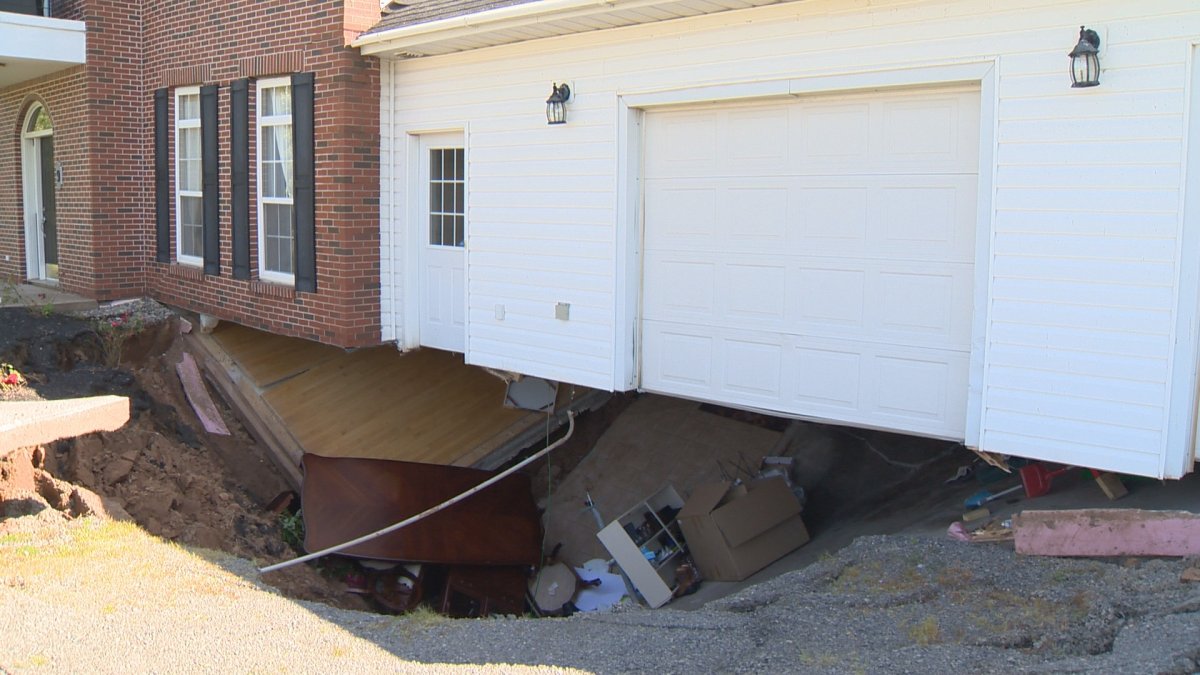Officials with the Nova Scotia Department of Natural Resources have told Global News that the area where a home was ruined due to the appearance of a large hole under the structure is already considered at “high risk” for sink holes.

Bob Ryan is a Geologist with the Nova Scotia Department of Natural Resources. He says the area in Falmouth, N.S., where the two-storey home is located, is mapped as “high risk” for naturally occurring sink holes.
“It makes it a high risk because of the rock type that’s underneath the gypsum,” said Ryan.
“It doesn’t amount to a lot of land area but it is spread around the province.”
READ MORE: The night a Nova Scotia house fell into the ground
The Nova Scotia family who lost everything is still trying to deal with the aftermath of the hole that opened up under their two-storey home in Falmouth over the weekend.
Heather Strickey says when she heard crashing noises she originally thought someone had broke into her home on Mountain View Drive early Sunday morning. However, she soon realized her house was sinking into the ground.
“My 16-year-old and I thought there was an intruder and that at some point they would finish looting the first floor and come up to the second floor,” Strickey told Global News.”In the end, I think people are stunned that we can be so positive but we really, truly thought we would be in confrontation with someone. This to me, is way better. It’s awful and no one wants it to happen but at least no one was trying to hurt us.”
Municipality not calling incident a “sink hole”
Although the incident was referred to as a “sink hole” in two news releases on Sept. 3, The Municipality of the District of West Hants was reluctant to call what happened under Strickey’s home a sink hole on Tuesday.
CAO Cathie Osborne said they are waiting for a report to be complete by a Geotechnical Engineer who assessed the property.
She described the incident as soil giving away under the slab of the home, which created a large hole.
Sink holes not uncommon in Nova Scotia but this type of damage is rare
While he hasn’t seen the site in Falmouth himself, Ryan said in general terms that the public would use, what happened in Falmouth would be considered a sink hole.
“Naturally occurring sink holes are related to a dissolving of the rock. In this case, gypsum most of the time and the ground water makes a cavern or a cave and simply a sink hole is when the roof of the cave collapses in,” he said.
Ryan said it’s not uncommon for sink holes to happen in the province — but it is unusual to see the type of damage that occurred in Falmouth.
“It’s rare that we see it damaging properties but as a phenomenon, it’s not rare at all. It’s actually very common.” said Ryan.
“Sink holes open up all the time but usually they’re in somebody’s back yard or front yard or our in the middle of the woods where nobody can see them.”
Falmouth mapped as “high risk” for sink holes
In addition to Falmouth, there are sporadic areas across Nova Scotia that are also considered high risk for sink holes, including Windsor, Kennetcook, Shubenacadie, Cape Breton and Antigonish.
“Even though we have high-risk areas, actual damage to infrastructure and houses is rare. It doesn’t mean there isn’t a risk but it doesn’t mean your house is going to go into a sink hole tomorrow either,” said Ryan.
Ryan advises people who are concerned about sink holes to get in contact with a Geotechnical firm that has specialized equipment and the expertise to deal with these types of issues.
“Most of the time, if you know ahead of time, you can mediate around them,” he said. “The problem is when you don’t know, like what happened in Falmouth.”
The province has a map of all areas in Nova Scotia that are considered high risk for sink holes. That information can be found by clicking on their website.
- Life in the forest: How Stanley Park’s longest resident survived a changing landscape
- ‘Love at first sight’: Snow leopard at Toronto Zoo pregnant for 1st time
- Carbon rebate labelling in bank deposits fuelling confusion, minister says
- Buzz kill? Gen Z less interested in coffee than older Canadians, survey shows












Comments